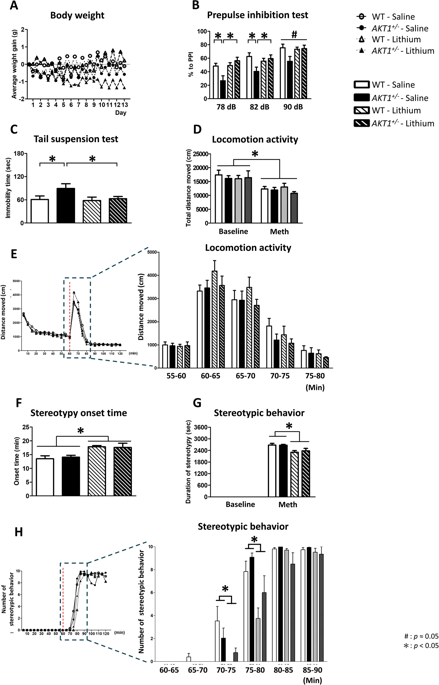Our official English website, www.x-mol.net, welcomes your feedback! (Note: you will need to create a separate account there.)
Lithium for schizophrenia: supporting evidence from a 12-year, nationwide health insurance database and from Akt1-deficient mouse and cellular models.
Scientific Reports ( IF 4.6 ) Pub Date : 2020-01-20 , DOI: 10.1038/s41598-019-57340-8 Da-Zhong Luo , Chia-Yuan Chang , Tsung-Ren Huang , Vincent Studer , Tsu-Wei Wang , Wen-Sung Lai
Scientific Reports ( IF 4.6 ) Pub Date : 2020-01-20 , DOI: 10.1038/s41598-019-57340-8 Da-Zhong Luo , Chia-Yuan Chang , Tsung-Ren Huang , Vincent Studer , Tsu-Wei Wang , Wen-Sung Lai

|
Accumulating evidence suggests AKT1 and DRD2-AKT-GSK3 signaling involvement in schizophrenia. AKT1 activity is also required for lithium, a GSK3 inhibitor, to modulate mood-related behaviors. Notably, GSK3 inhibitor significantly alleviates behavioral deficits in Akt1-/- female mice, whereas typical/atypical antipsychotics have no effect. In agreement with adjunctive therapy with lithium in treating schizophrenia, our data mining indicated that the average utilization rates of lithium in the Taiwan National Health Insurance Research Database from 2002 to 2013 are 10.9% and 6.63% in inpatients and outpatients with schizophrenia, respectively. Given that lithium is commonly used in clinical practice, it is of great interest to evaluate the effect of lithium on alleviating Akt1-related deficits. Taking advantage of Akt1+/- mice to mimic genetic deficiency in patients, behavioral impairments were replicated in female Akt1+/- mice but were alleviated by subchronic lithium treatment for 13 days. Lithium also effectively alleviated the observed reduction in phosphorylated GSK3α/β expression in the brains of Akt1+/- mice. Furthermore, inhibition of Akt expression using an Akt1/2 inhibitor significantly reduced neurite length in P19 cells and primary hippocampal cell cultures, which was also ameliorated by lithium. Collectively, our findings implied the therapeutic potential of lithium and the importance of the AKT1-GSK3 signaling pathway.
更新日期:2020-01-21


























 京公网安备 11010802027423号
京公网安备 11010802027423号